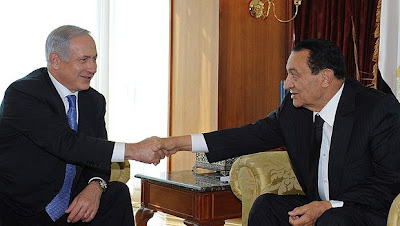- senior officials consider his demands of Mubarak to have given the impression of an imperious master dealing with a servant ........he has left Mubarak with no honourable way out, and made no mention of his positive achievements during 30 years of intimate relations with Washington....... Israel compares to US demands for a total settlement freeze, making it impossible for the Palestinians to compromise on settlements.
Israel also decries the demands for quick, open elections before preconditions for democracy -- an independent judiciary, the creation of a civil society and other institutions -- are put into place. Without such measures, they argue, it will be too easy for the Muslim Brotherhood to seize power. They point to Hamas's victory at the polls, and its subsequent violent seizure of power in Gaza, as a case in point. .....In the medium term, there are fears that a new Egyptian government that includes the Muslim Brotherhood would be much more sympathetic to Hamas, and might turn a blind eye to the import of weaponry into Gaza. In the long term, the Israelis fear that Egyptian developments may lead to a greater radicalisation throughout the region ..... However, Israeli security analysts believe that any new Egyptian government will have little choice but to focus on domestic issues in the short term. Moreover, they know that a formal break with Israel could have significant economic consequences for Egypt:
- Egypt originally sought peace because the cost of maintaining a massive army was a huge drain ....
- Gas sales to Israel are a major earner of foreign exchange....
- Tens of thousands of Egyptian jobs are now dependent on the Qualified Investment Zones. Under a 2004 agreement, Egyptian exports from these zones enter the United States customs-free if they have a certain percentage of Israeli inputs.
Peace process. While officials are acting cautiously, hard-line nationalists have already launched a major public relations campaign claiming that, as the potential overthrow of Mubarak has shown, any peace agreement with any Arab country is inherently at risk -- and that a deal with the Palestinians would be even more risky. Moreover, the Palestinian National Authority, seemingly attempting to ward off contagion, has announced that it will hold municipal and general elections later this year. This may provide Netanyahu with another reason not to resume the peace talks. Furthermore, the peace process has always been reliant on support from other Arab states, with Egyptian support crucial; the emergence of a different government could see this support dissolve. ..."
"'America is something that can be easily moved. Moved to the right direction.They won’t get in our way'" Benjamin Netanyahu
Friday, February 4, 2011
'Israel has all but given up on Obama'
Oxford Analytica: Excerpts:
Subscribe to:
Post Comments (Atom)

3 comments:
If they really have then they are idiots because he has probably just "stabilized" Egypt for them as it looks like Mubarak will stay until September and then the elections will be rigged!
However, I think this is a front to make it easier for Obama to "stabilize" Egypt.
If Obama had really wanted Mubarak gone all he had to do was call Diddy Cameron and the Swiss then tell them to investigate this and how about seizing some of it in the mean time.
Interesting take on a issue alot of people have been discussing.
My less intelligent take:
Firstly I think Obama might have made a smart point to Israel in ignoring their recent calls by Israel to stop calling for Mubarak to go.
If Netanyahu insists on fighting Obama on the two state solution and refusing to budge why should Obama listen to Netanyahu. It is all about power at this level and Obama "might" be showing Israel that you cannot disrespect a US President and not pay a price.
Second: Boo Hoo Israel. If Israel is facing an entire Arab world that is hostile it is there own fault. They don't get to blame the US for losing good relations with Turkey. Israel inflicted that wound on themselves by shooting Turkish civilians. Also Israel cannot say they want friendly relations with Iran after conspiring plotting and threatening Iran since 2003 onwards. If Israel wakes up tomorrow with no friendly neighbours they can't blame it on the US.
3) Colonialist thinking obviously remains unaffected in Israel. "Israel also decries the demands for quick, open elections before preconditions for democracy -- an independent judiciary, the creation of a civil society and other institutions -- are put into place."
This is Israels new line "we are for democracy in the Arab world but those Arabs don't have the civil society to foster democracy".
Israel says before democracy Egypt needs an Independent Judiciary. Firstly I read just the other day that 2000 judges took to the street to support the protesters. Secondly Egypt already has a civil society albeit one that is organised by the Muslim Brotherhood at a grassroots level.
But aside from all this who says that you need institutions first and then a democracy? Most states that become democracies do the voting first and then work on building national institutions.
Think Ancient Greece, The US after Independence or the Eastern European states who dismantled the communist institutions and then had elecions and made new ones.
Post a Comment